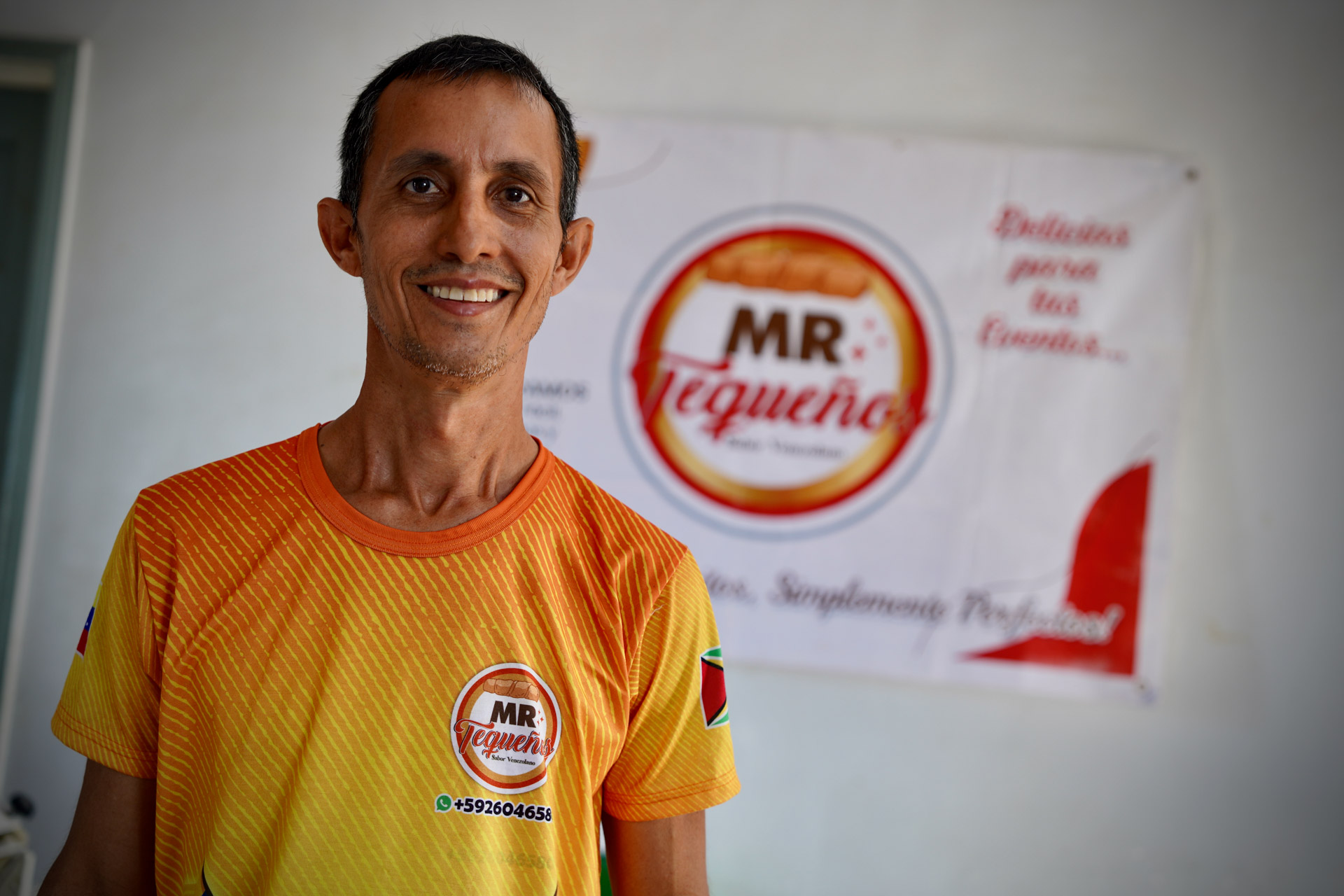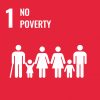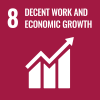Georgetown, 19 June 2023 – At the break of dawn, Alis and Rosemarys wake up to prepare and sell Venezuelan food orders. Before opening their business for the day, they take their seven-year-old daughter, Sofia, to school. "There are many savory Venezuelan foods with the potential to conquer the Guyanese palate," explains Alis, a graduate in administration and management from Puerto Ordaz, the commercial heart of Eastern Venezuela, who now lives with his family in Guyana’s capital, Georgetown.
Their gastronomic journey began during the height of the pandemic. Mr Tequeños officially opened for business in 2020, thanks in part to support from the International Organization for Migration (IOM) in Guyana. After Alis lost his job at a restaurant in Georgetown, he and his wife, Rosemarys, decided to set their sights on the food industry starting a small business selling tequeños – a traditional Venezuelan fried cheese stick – for delivery.

Alis and Rosemarys making tequeños for delivery. Photo: IOM/Gema Cortes

Tequeños are a traditional Venezuelan fried cheese stick, and they are already winning over Guyanese palates. Photo: IOM/Gema Cortes
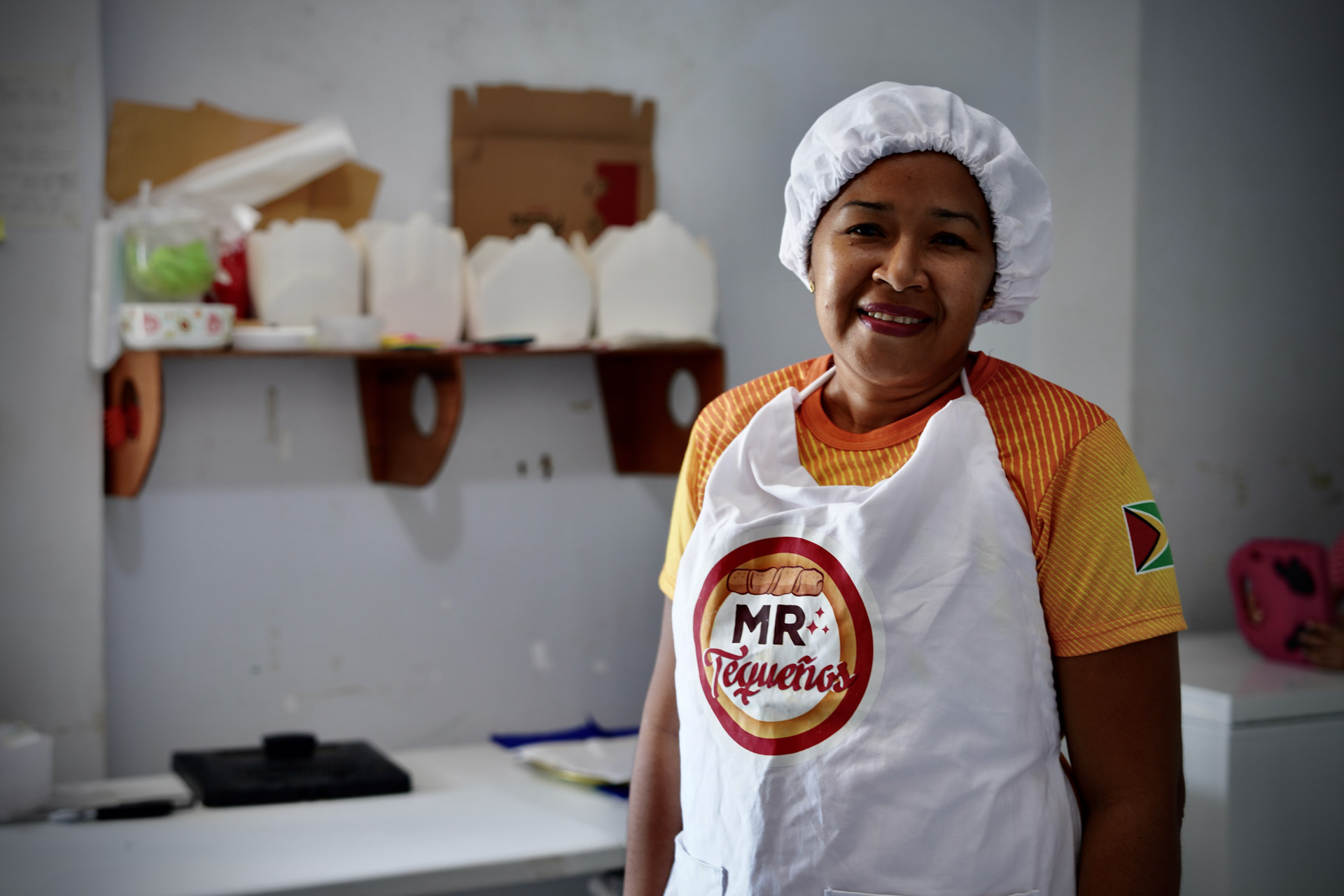
Rosemarys learned how to cook to cover her family’s needs. Photo: IOM/Gema Cortes
The couple is among many Venezuelan migrants who are rebuilding their lives in Guyana by cooking and selling food from their country. “Mr Tequeños has given us a dignified livelihood, allowing us to pay our rent, cover our needs and support our families in Venezuela,” explains Rosemarys, a former lawyer and senior technician in metallurgy who had to reinvent herself and learn to cook.
After posting photos of their homemade pastry on social media, they went from receiving a few orders to baking more than 600 tequeños a day, for corporate clients and buffets. Soon their menu expanded to include traditional, corn-based, Venezuelan snacks like arepas, empanadas, and bread.
Fostering entrepreneurship
The humanitarian environment created by the Government of Guyana for migrants from Venezuela has facilitated livelihood-based programmes benefitting many migrants in various regions across the country.
Alis had participated in a livelihood support programme organized by IOM for Venezuelan migrants. This programme provided the selected migrants with entrepreneurial and financial literacy training, mentorship, and seed funding to start or expand their small businesses. The programme stimulated entrepreneurial culture, empowered migrants to be agents of change and enabled their successful economic and societal integration into Guyana.

Rosemarys and Alis have taken their business to social media and different platforms. Photo: IOM/Gema Cortes

Rosemary making tequeños. Photo: IOM/Gema Cortes
Since the programme started in 2020, it has helped more than 60 migrant entrepreneurs develop the skills they need to survive and thrive. “These trainings are helping Venezuelans across Guyana gain the tools to be self-sufficient and contribute to their host countries,” says Fiona Stoll, IOM Programme Assistant.
Alis and Rosemarys were able to secure seed capital which allowed them to buy a computer, utensils, supplies, and other materials. "This support was a boost to our business; we acquired knowledge to better shape our business and grow with new equipment," Alis recalls.
For migrants, these opportunities provide a vital source of income during a difficult period and spark a sense of hope for the future. "Entrepreneurship is not easy, but it can be done. If you ask me if I want to go back to practicing law or to continue baking, I would say that Mr Tequeños is my life now,” Rosemarys says as she kneads a pastry.

The tequeños produced by Rosemarys and Alis are delivered to a wide variety of clients. Photo: IOM/Gema Cortes
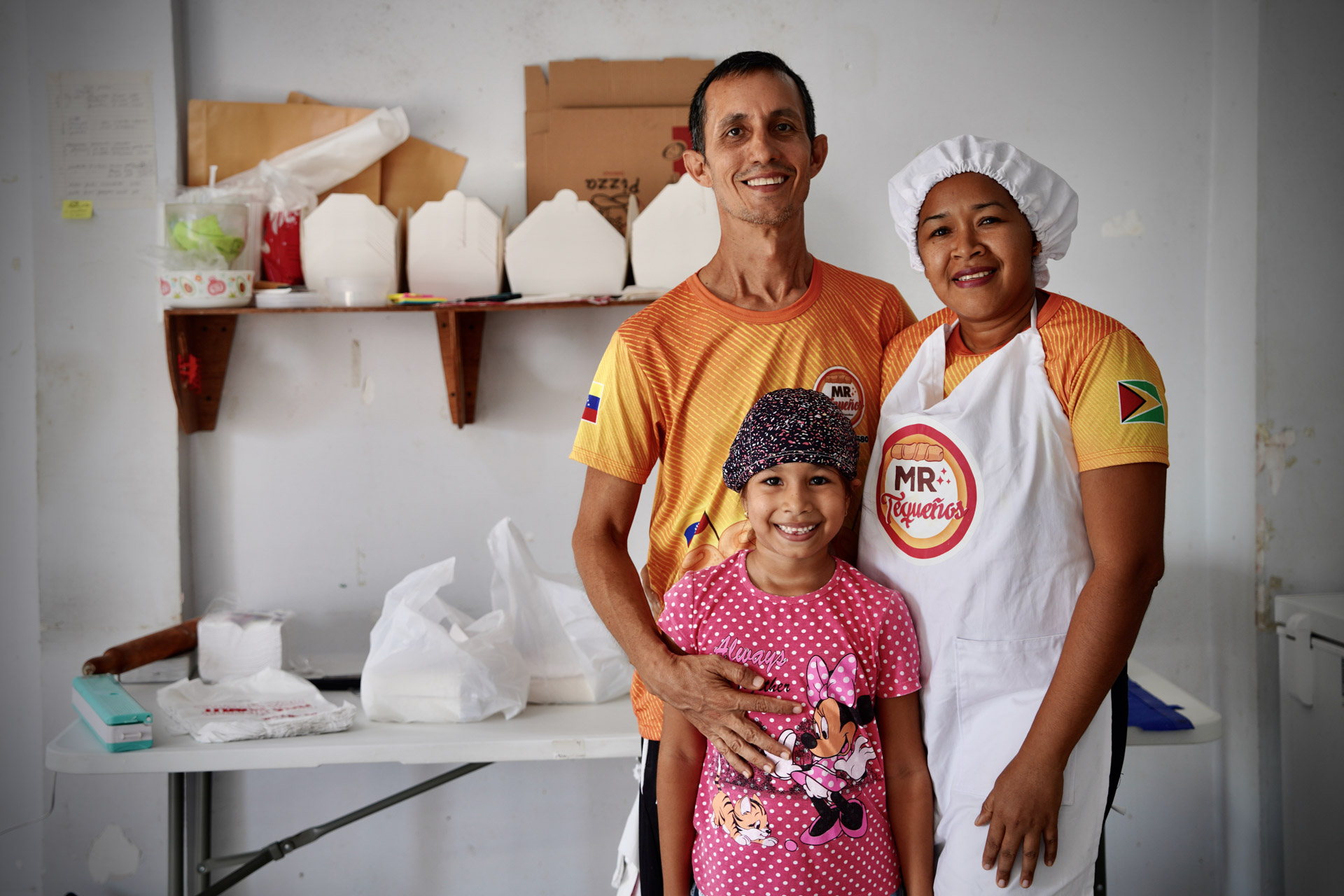
Alis, Rosemarys and Sofia are rebuilding their lives in Guyana by cooking and selling food from their country. Photo: IOM/Gema Cortes
Harnessing hope for the future
Many migrants are finding the white corn flour patties an ideal means for gaining their footing in a foreign nation while maintaining a culinary tradition. Arriving in 2019, with very little, but with plenty of faith, Alis and Rosemarys were able to gradually build a life in their new home, overcoming the initial language barrier.
Several of Alis’s customers are Venezuelans eager for a taste of home, as well as many Guyanese, who have come to love the different fare. Every day they see more locals coming to try Venezuelan food. “It gave me great pleasure because I hadn’t eaten so good Venezuelan food in many years,” Ciro, a regular Venezuelan customer, says. “Venezuelan flavor transcends borders, everything is very tasty here,” says Janeth, a Colombian customer.

Mr. Tequeños has several frequent clients. Photo: IOM/Gema Cortes

Besides tequeños, Alis and Rosemarys are now also selling other traditional, corn-based, Venezuelan snacks like arepas, empanadas, and bread. Photo: IOM/Gema Cortes
Like the more than 19,000 Venezuelan migrants living in Guyana, which shares a border with Venezuela, Alis and Rosemarys are optimistic for their future and are working tirelessly for their dreams to come true. “In the long term, we all want to return to Venezuela because our roots are there; our parents, our brothers, and our sisters. Our dream is that the family business continues to operate in Guyana while we can return to Venezuela,” says Rosemary with nostalgic tears.
This story was written by Gema Cortes, IOM Media and Communications Unit, Office of the Special Envoy for the Regional Response to the Venezuela Situation.
